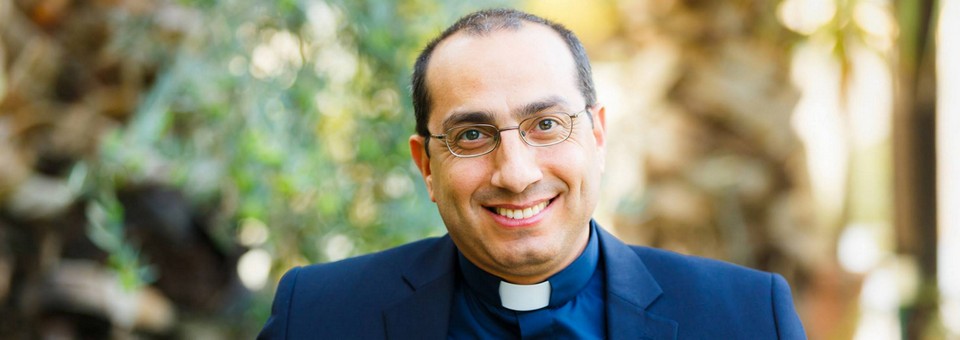INTERVIEW – On August 9, 2018, the Palestinian Ministry of Education approved the integration of the Catechism book for the General Secondary Education Certificate Examination also known as Tawjihi. For this reason, the Media Office interviewed Fr. Iyad Twal, Director of the Latin Patriarchate Schools in Palestine and Israel, to talk about this important accomplishment.
How did work start on developing a Catechism textbook for Tawjihi students? And how did you accomplish this goal?
In 1999, we started working to develop ecumenical Catechism textbooks for all grades, from the first to the 12th grades in order for the Christian and public schools in Jerusalem and the West Bank to adopt this in the curriculum. In 2012, an ecumenical committee, comprised of Tawjihi teachers from the different churches in the Holy Land, was formed for the purpose of paving the way towards submitting the request of integrating the Catechism textbook and examination to the Ministry of Education. This committee worked under the supervision of the General Secretariat of Christian Schools during the time of its former General Secretary, the late Fr. Faysal Hijazin, to develop Christian Catechism textbooks for Tawjihi students. In 2014, Tawjihi students attending Christian schools in Jerusalem and the West Bank sat for a standardized Catechism examination for the first time in our schools. The test, prepared by the members of the committee, adopted the style of the ministry tests in order to train both the teachers and students for this approach.
Between supporters and opponents; supporters with a view of raising faith-filled students, and opponents with a view of the additional burden this step will impose on students and parents. Where do you stand on this matter?
The vast majority of schools and institutions support this step. What matters most for us than being with or against is the Church’s attitude towards it since 1999. At that time, our approach was based on the position of the Heads of Churches, directors of schools and the General Secretariat. Now, and after facing some hesitations and not being aware of the procedures, we consider it a historical achievement. Firstly, it affirms the strong presence of Christians and then the government’s recognition of the right of Christian students vis-à-vis other students taking the Tawjihi examinations in Palestine. Secondly, it emphasizes the good relations and mutual cooperation between the Churches and the Palestinian Authority. Finally, this achievement and benefit for our schools is the fruit of 15 years of hard work and cooperation.
Furthermore, the Tawjihi system allows students to choose specific subjects to be counted, where Christian students had fewer options compared to Muslim students, and Catechism was not one of them. However, what was achieved recently has given equal opportunities to all students taking the examinations. In addition, the new step opens new doors for employment for Bethlehem University graduates, especially those who major in Religious Studies and minor in Education.
What strategies will be followed to teach the new textbook?
The curriculum was written by professional Catechism teachers and based on an educational and academic foundation under the direct supervision of the Ministry of Education. For example, students will develop their critical thinking, conduct researches, and actually learning instead of memorizing. Thus, critical thinking and research are built up in Catechism. As we know, religious studies have a big part of the information that a student needs to know, learn and understand. On the spiritual level, for the most part, our students enter the school from grade one, and they work hard to enrich the spiritual level in every class, but not in Tawjihi, as the school will deal differently with Tawjihi students than with other classes. This new step requires an ample consideration from teachers, students, and parents for it to reach the level of spiritual life we want our children to live.
Besides, this new step is considered an achievement of the Church in Palestine, as it underlines our unity rather than the difference, as well as our ecumenical mission. Today, many countries request that we share with them some of our guidelines and experience in producing such ecumenical material.
How are Catechism teachers being prepared? Are there enough facilities in both public and private schools to teach Catechism?
The curriculum was released a few years ago for both teachers and students; teachers had a manual and students had template answers. Students sat for a standardized test that was corrected by a committee, which was a process that conformed with the Ministry examination.
The General Secretary for Schools makes every effort to train teachers. Also, the Ministry of Education will soon conduct training sessions for Tawjihi Catechism teachers, in order to train them on teaching methods and plans preparation. However, preparing schools and its facilities is an ongoing challenge, as schools need tools, equipment, educational resources, and training. Let us not forget that we are still taking the first steps in this historical event, and every new step requires training, support and maintenance. The General Secretary and the ecumenical committee, with the different churches will continue to facilitate and reinforce the support needed in emerging challenges regarding this initiative.
The integration of the Catechism book for Tawjihi is a historical achievement, a success to be shared by and with many people and Churches, of the work that began 20 years ago!
Interview conducted by Rula Shomali
Source: Latin Patriarchate of Jerusalem






